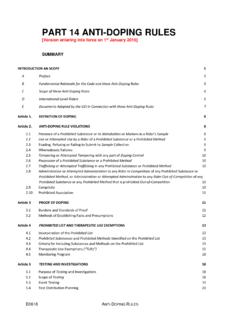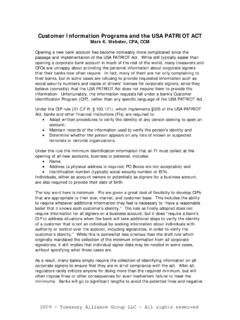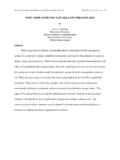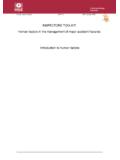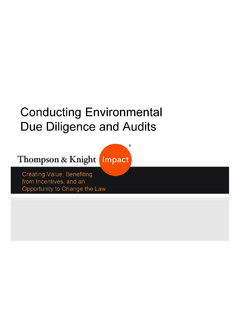Transcription of The War on Drugs: Undermining Human Rights
1 war on drugs : Undermining Human Rights The global war on drugs has been fought for 50 years, without preventing the long-term trend of increasing drug supply and use. Beyond this failure, the UN Office on Drugs and Crime (UNODC) has identified many serious unintended negative consequences of the drug war including widespread Human Rights abuses.(1) These Human Rights costs result not from drug use itself, but from choosing a punitive enforcement-led approach that, by its nature, criminalises many users, often the most vulnerable in society, and places organised criminals in control of the trade. This briefing summarises these Human Rights costs. There is naturally overlap with other areas of the Count the Costs project, including: security and development, discrimination and stigma, public health, crime, the environment, and economics.
2 For briefings and a more extensive collection of resources on these costs see every region of the world the war on drugs is severely Undermining Human Rights . It has led to a litany of abuse, neglect and political scapegoating through the erosion of civil liberties and fair trial standards; the denial of economic and social Rights ; the demonising of individuals and groups; and the imposition of abusive and inhuman punishments. Too often these Human Rights violations are considered in isolation a drug user beaten by police to extract ContentsIntroduction .. 1 Human Rights costs of the war on drugs : 1. drug use and criminalisation .. 3 2. The right to a fair trial and due process standards .. 4 3. Torture and cruel, inhuman or degrading treatment or punishment.. 5 4. The death penalty and extrajudicial killings.
3 6 5. Over-incarceration and arbitrary detention .. 7 6. The right to health .. 9 7. The right to social security and an adequate standard of living .. 11 8. Rights of the child .. 11 9. Cultural and indigenous Rights .. 13 Are there benefits? .. 13 How to count the costs? .. 14 Conclusions .. 14information; a drug courier executed by firing squad; a family killed at a military checkpoint; an HIV worker imprisoned for distributing harm reduction information; a family displaced by aerial fumigation of their crops; a drug user detained for years of forced labour and beatings on the recommendation of a police officer; a cancer sufferer denied pain-killing medicine. But they are not isolated. They are all a direct consequence of the war on drugs . Like the war on terror, the war on drugs is framed as a response to an exceptional, existential threat to our health, our security, and indeed the very fabric of society.
4 The Addiction to narcotic drugs is portrayed as an evil the international community has a moral duty to combat because it is a danger of incalculable gravity that warrants a series of (otherwise publicly unacceptable) extraordinary measures. This is not an exaggeration of the political rhetoric. These words are enshrined in international law, including the 1961, 1971 and 1988 UN drug conventions.(2) This crusading language has created a political climate in which drug war policy and enforcement are not required to meet Human Rights norms.(3) In fact, despite being one of the three pillars of the UN s work (along with development and security), these international agreements lack any obligation to ensure compliance with Human Rights . In over one hundred articles, Human Rights appear specifically only once (in relation to crop eradication)(4) a staggering omission in treaties negotiated and adopted post-World War II, in the era of the modern Human Rights movement.
5 This omission is now reflected in national law and policy worldwide. Through production, transit, sales and use, the responses to every stage in the supply chain of illicit drugs are characterised by extensive Human Rights violations, committed in the name of supply and demand reduction. In order to meaningfully count these Human Rights costs, it is necessary to not only see the connections between law and policy, and the effects on the ground, but also to make comparisons with what happens under alternative approaches, including the decriminalisation of the possession of drugs, and models of legal regulation. For example, most of the abuses resulting from a punitive, enforcement-led approach to illegal drugs do not occur in relation to the Respect the Human Rights of people who use drugs. Abolish abusive practices carried out in the name of treatment such as forced detention, forced labor, and physical or psychological abuse that contravene Human Rights standards and norms or that remove the right to self-determination.
6 Global Commission on drug Policy 2011 Commissioners include: Kofi Annanformer Secretary-General of the United Nations Asma Jahangirformer UN Special Rapporteur on Arbitrary, Extrajudicial and Summary Executions Michel KazatchkineExecutive Director of the Global Fund to Fight AIDS, Tuberculosis and Malaria Thorvald Stoltenberg former Minister of Foreign Affairs and UN High Commissioner for Refugees C sar Gaviriaformer President of Colombia; Ernesto Zedilloformer President of Mexico Fernando Henrique Cardosoformer President of Brazil George Papandreou Prime Minister of Greeceproduction, sale and use of tobacco, alcohol and prescription , just as UN member states refer to shared responsibility for drug control, so too must they bear shared responsibility for Human Rights abuses perpetrated in its name.
7 That is what Count the Costs is about taking responsibility and openly evaluating all policy impacts, and all other Human Rights costs of the war on drugs 1. drug use and criminalisation Global drug usage has risen dramatically since the war on drugs started. The UNODC estimates, probably conservatively, that between 155 and 250 million people worldwide, or to of the population aged 15-64, used illicit substances at least once in the last year. Global lifetime usage figures are much higher, probably approaching one billion. Yet a punitive response to drug use remains at the core of the war on drugs is no specific right to use drugs, nor is an argument for one being made. However, debates around the Rights and wrongs of individuals drug use should not obscure the fact that enforcing the criminalisation of consenting activities of hundreds of millions of people impacts on a range of Human Rights , including the right to health, privacy, and freedom of belief and practice, and involves substantial Human costs.
8 The centrality of criminalising users means that in reality a war on drugs is to a significant degree, a war on drug users; a war on people. The impact of criminalisation and enforcement varies, with sanctions against users ranging from formal or informal warnings, fines and treatment referrals (often mandatory), to lengthy prison sentences and punishment beatings. Within populations impacts also vary, but are concentrated on young people, certain ethnic and other minorities, socially and economically deprived communities, and problematic for possession/use are frequently grossly disproportionate, violating another key tenet of international law: In Ukraine, the possession of minimal amounts of drugs (from ) can lead to three years in prison(5) 3 Punishments for drug possession and use are often grossly disproportionate and contribute to spiralling prison populations (Photo credit.)
9 California Department of Corrections and Rehabilitation) In Russia, a person can be imprisoned for one and a half years for solution traces in a used needle In Georgia urine tests for drugs can serve as a basis for imprisonment(6) The UN Special Rapporteur on the right to health (see box) has called on UN member states to decriminalize (7) or de-penalize possession and use of drugs . It is a call that has been echoed by the UN Secretary-General,(8) and the heads of UNAIDS(9) and the Global Fund to Fight AIDS, Tuberculosis and Malaria in the context of HIV/AIDS,(10) and by high profile politicians including many serving and former heads of state in the context of Human Rights , security and development. 2. The right to a fair trial and due process standards The marginalisation of Human Rights in drug law enforcement can be witnessed in the widespread erosion of due process in dealing with drug offenders:Alternative justice systems In many countries drug offenders are subject to parallel systems of justice that do not meet internationally recognised fair trial standards.
10 For example, in Iran, drug trafficking defendants are tried before revolutionary courts(11) where defence counsels may be excluded from the hearing and appeals are not allowed on points of law. Similarly in Yemen, drug defendants are subject to trial before Specialized Courts where trials are generally reported to fall short of international standards of fair trial , according to Amnesty International.(12) Many of the trials that are held before these courts are death penalty cases. In Egypt,(13) drug defendants have been included in decades-old emergency laws that allow certain drug cases to be tried in emergency or military courts which lack the due process protections of civilian courts. These courts have also been empowered to rule on death penalty cases. Presumption of guiltElements of drugs enforcement in many countries have seen a reversal of the burden of proof, with the presumption of innocence effectively replaced with a presumption of guilt.



